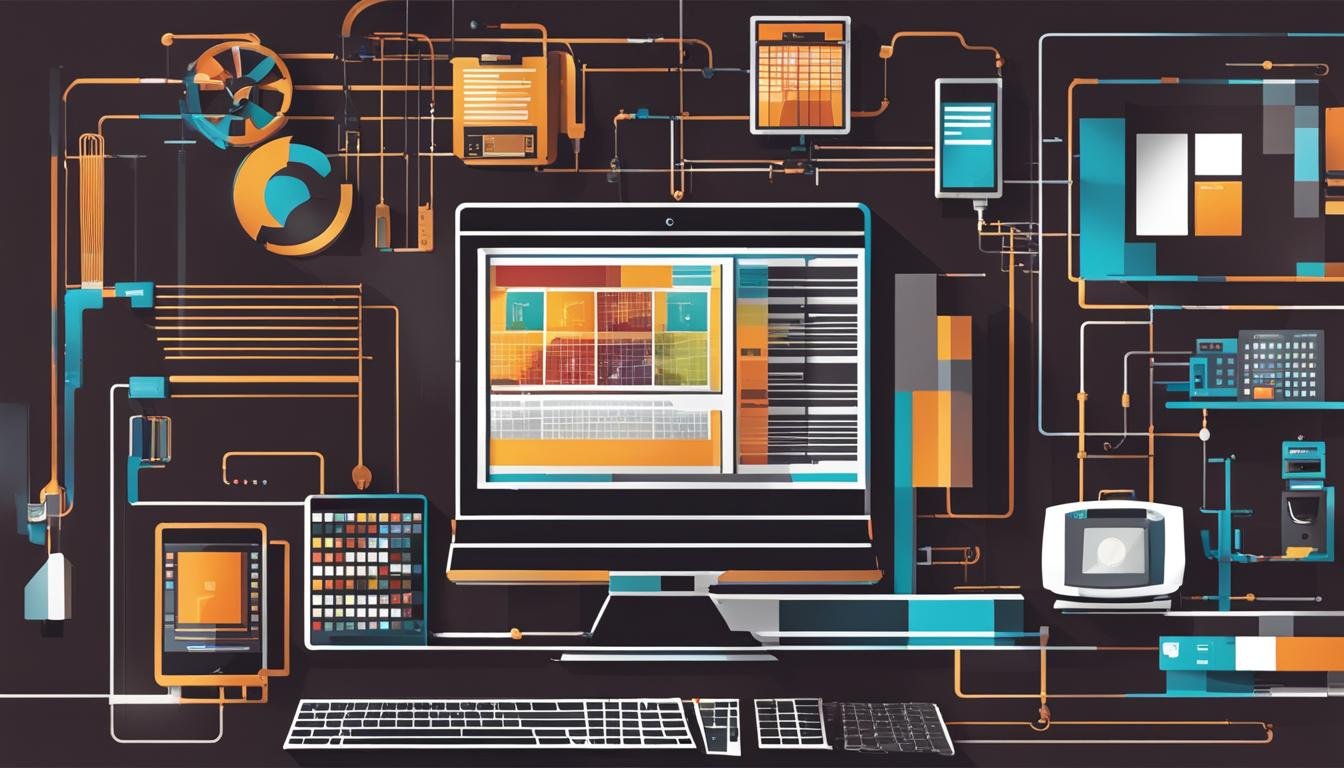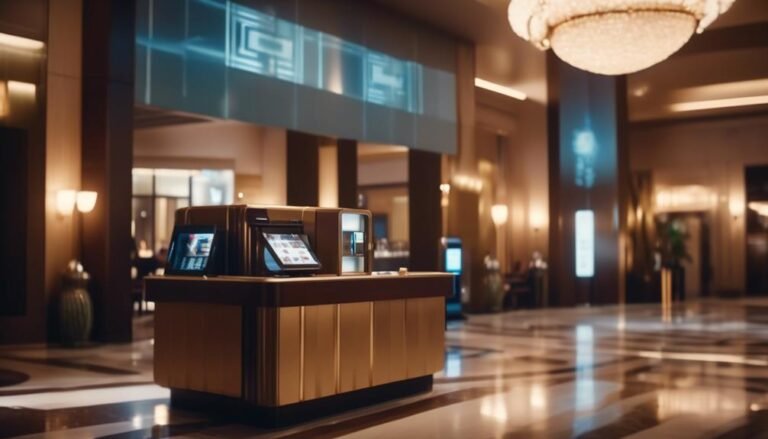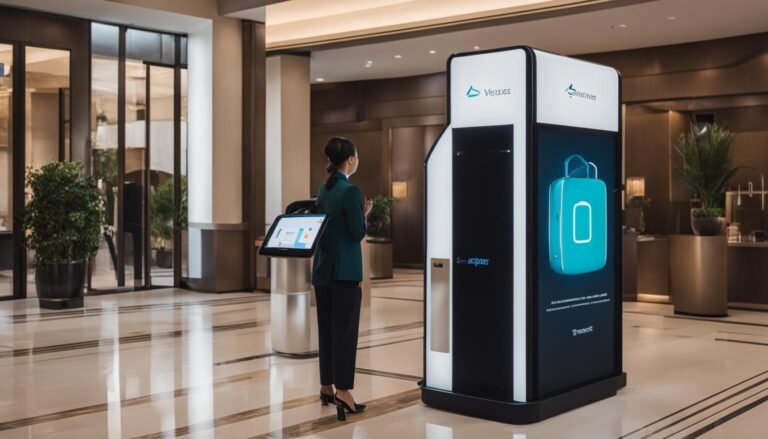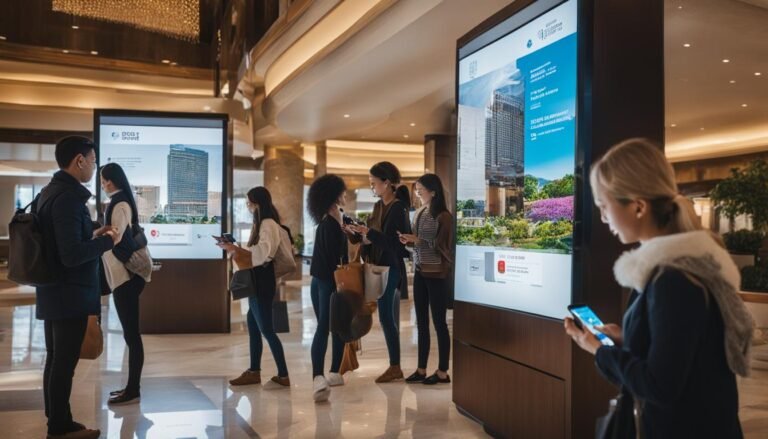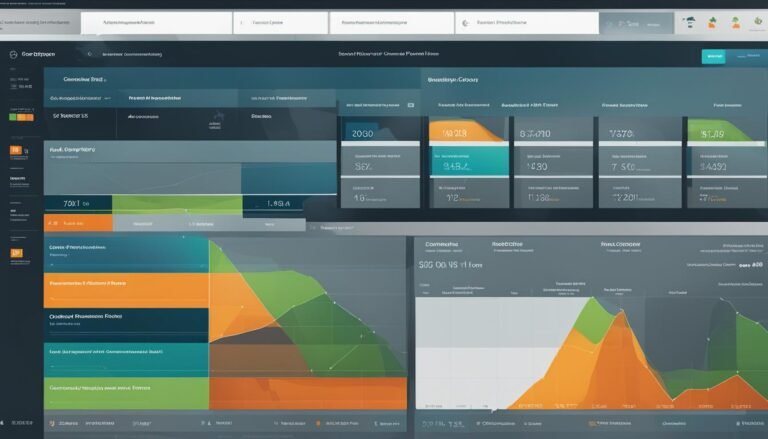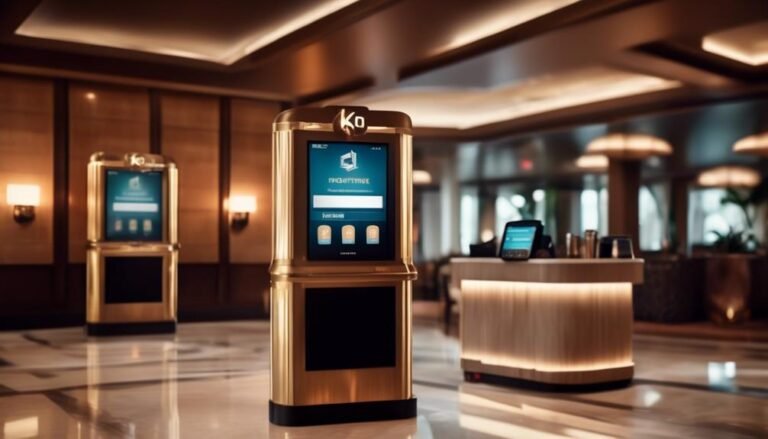The Evolution of Property Management Systems in Hospitality
In the rapidly evolving hospitality industry, property management systems (PMS) have become an essential part of hotel management. These systems have come a long way, from basic manual processes to sophisticated cloud-based solutions. As technology continues to shape the hospitality landscape, it is crucial to understand the progression of PMS in order to meet the ever-changing needs of hotels and guests.
Key Takeaways:
- Property management systems have evolved from manual processes to cloud-based solutions.
- PMS technology plays a crucial role in hotel management and guest experience.
- Cloud-based PMS systems offer scalability, cost-efficiency, and improved performance.
- The future of PMS technology lies in mobile-first, open API, and guest-centric solutions.
- PMS technology will continue to shape the future of the hospitality industry.
A Brief History of the Hotel Property Management System (PMS)
The hotel property management system (PMS) has come a long way since its inception in the late 1970s. Initially designed to automate manual and paper-based administrative tasks in the hotel industry, PMS technology has evolved to become an integral part of hotel operations.
From its early days of automating reservations, guest profiles, room inventory, and check-in/check-out processes, PMS technology has expanded to encompass a wide range of functions. Today, PMS systems not only streamline administrative tasks but also provide hotels with valuable insights and analytics to enhance the guest experience.
The evolution of PMS technology has been driven by the increasing automation and digitalization of the hotel industry. Advancements in technology have allowed PMS systems to become more sophisticated, offering features such as online bookings, mobile check-in, and integration with third-party applications.
As the hospitality industry continues to embrace automation and technology, the future of PMS systems looks promising. With the rise of cloud-based solutions, open API integrations, and a focus on guest-centricity, PMS technology is set to unlock new possibilities and drive innovation in the industry.
Table: Evolution of PMS Technology
| Decade | Key Milestones |
|---|---|
| 1970s | Introduction of basic PMS systems for automating reservations and guest profiles. |
| 1980s | Integration of PMS with front office operations and financial management. |
| 1990s | Introduction of web-based PMS systems and online bookings. |
| 2000s | Integration of PMS with revenue management and channel management systems. |
| 2010s | Emergence of cloud-based PMS systems and mobile check-in capabilities. |
| 2020s | Focus on guest-centricity, data analytics, and integrations with emerging technologies. |
“The evolution of PMS technology has revolutionized the way hotels operate. From streamlining administrative tasks to leveraging data analytics for personalized guest experiences, PMS systems have become indispensable in today’s hospitality industry.” – Hotel Technology Expert
The Role of PMS in Today’s Hospitality Industry
The role of property management systems (PMS) in the hospitality industry has evolved to encompass much more than basic administrative functions. Today, PMS technology plays a crucial role in hotel management, enabling hoteliers to deliver exceptional guest experiences and adapt to changing consumer behavior.
In a highly competitive industry, hotels are not just selling rooms; they are selling experiences. PMS technology helps hotel managers streamline operations, manage bookings, maintain guest profiles, and track revenue. By centralizing these functions, PMS software allows hoteliers to focus on providing personalized services and ensuring guest satisfaction.
Enhancing the Guest Experience
Guest experience is a key driver in the hospitality industry, and PMS technology helps hotels deliver exceptional service. With integrated PMS software, hotel staff can access real-time information on guest preferences, enabling them to personalize the guest experience from check-in to check-out.
PMS technology also enables hotels to leverage data analytics to gain insights into consumer behavior. By analyzing guest data, hotels can identify trends, preferences, and areas for improvement. This information can be used to make data-driven decisions and create more personalized experiences that cater to the unique needs and expectations of individual guests.
| Benefits of PMS in Today’s Hospitality Industry |
|---|
| Streamline hotel operations |
| Manage bookings and check-ins |
| Personalize guest experiences |
| Track revenue and financial performance |
| Gain insights into consumer behavior |
“PMS technology plays a vital role in enabling hotels to meet the rising expectations of modern travelers and provide personalized experiences that drive guest satisfaction.” – Hotel Technology Expert
Furthermore, PMS technology allows for seamless integration with other hotel systems, such as revenue management and guest relationship management platforms. This integration improves operational efficiency, streamlines processes, and enhances communication between different departments, ultimately leading to a more cohesive and guest-centric approach.
In conclusion, the role of PMS technology in the hospitality industry goes beyond basic administrative tasks. PMS software empowers hoteliers to deliver personalized guest experiences, gain insights into consumer behavior, and improve operational efficiency. As technology continues to evolve, PMS technology will play a crucial role in shaping the future of the hospitality industry.
The Platformization of PMS Technology
The evolution of property management system (PMS) technology in the hospitality industry can be compared to the evolution of mobile phones. Similar to how mobile phones have become platforms for multiple applications and technologies, PMS technology has undergone a process called platformization. This shift has been driven by various factors, including the rise of hotel online distribution, changing consumer expectations, and the need for seamless integrations.
In the past, hotels relied on standalone PMS systems that primarily focused on managing reservations, guest profiles, and check-in/check-out processes. However, with the increasing demand for online travel planning and booking, hotels now require more robust and integrated solutions. PMS technology has adapted to this demand by incorporating functionalities like online reservations, revenue management, and channel management.
However, the integration of different software solutions has not always been smooth. Legacy PMS providers, who dominate the market, often resist innovation and hinder integration efforts. This has resulted in challenges such as data fragmentation and limited flexibility. Hotels have struggled to provide a seamless guest experience due to the complexities associated with managing multiple systems.
Platformization: Enabling Seamless Integrations
The platformization of PMS technology has paved the way for improved integrations and enhanced guest experiences.
Fortunately, the platformization of PMS technology is changing the landscape. With the emergence of modern PMS companies that prioritize integration capabilities, hotels can now benefit from seamless connections between various software solutions. This allows for a more efficient and interconnected system, leading to streamlined operations and enhanced guest experiences.
By embracing an open API approach, these modern PMS providers enable hotels to integrate different functionalities, such as online reservations, housekeeping management, and analytics tools. This integration of multiple systems creates a unified and comprehensive platform that empowers hotels to meet the evolving needs of today’s tech-savvy travelers.
Overall, the platformization of PMS technology is revolutionizing the hospitality industry. As hotels continue to adapt to changing consumer expectations and leverage technology for improved operations, adopting a platform-based PMS solution is becoming crucial.
The Challenges of PMS Integrations
Integrating different software applications with property management system (PMS) technology presents several challenges for hotels in the hospitality industry. One major issue is the fragmentation of data, where information is stored in multiple systems, leading to difficulties in accessing and managing guest profiles efficiently. This fragmentation often results in duplicated efforts and inconsistencies in data, impacting the overall guest experience.
To address these challenges, legacy PMS systems have traditionally required costly and time-consuming integrations with other software solutions. The resistance to innovation from some legacy providers has further hindered the seamless integration of systems, impeding hotels’ ability to provide a streamlined experience for their guests.
However, advancements in PMS technology, along with the emergence of open API models, have improved integration possibilities and reduced complexities. Hotels can now leverage modern PMS solutions that offer more flexible integration options, allowing them to connect with a variety of software and platforms to streamline operations and improve the guest experience.
The Challenges of PMS Integrations at a Glance:
| Challenges | Solutions |
|---|---|
| Data Fragmentation | Implement a modern PMS with centralized data management capabilities to reduce fragmentation and improve accessibility. |
| Duplication of Efforts | Utilize integrated software solutions to automate processes and eliminate duplicated efforts in managing guest profiles and data. |
| Legacy Systems | Consider transitioning to modern PMS software with open API models, enabling seamless integration with other platforms and applications. |
Legacy PMS systems have long posed challenges when it comes to integrating with other software. The fragmented data and duplicated efforts have made it difficult for hotels to provide a seamless guest experience. However, with advancements in PMS technology and the rise of open API models, hotels now have the opportunity to overcome these challenges and create a more integrated and efficient system. By embracing modern PMS solutions and exploring flexible integration options, hotels can enhance their operations and deliver exceptional guest experiences.
The Future of PMS Technology: From Fragmentation to Consolidation
The current trend in PMS technology is a move towards consolidation and connectivity. The complexity of managing multiple systems and vendors has led to a fragmented tech stack, likened to a Frankenstein tech stack that is difficult to tame. To address this, experts in the field envision a future where PMS technology becomes more integrated and operates as a platform. Cloud-based solutions and open API models are playing a significant role in facilitating the consolidation of different tools and technologies into a cohesive system.
Connectivity is a key focus for modern PMS companies. By integrating with various software solutions, such as online reservations, revenue management, and channel management, hotels can streamline their operations and provide a seamless guest experience. This connectivity allows for real-time data sharing and eliminates the need for manual data entry, reducing the risk of errors and improving overall efficiency.
Creating a seamless guest experience is a top priority for hotels, and PMS technology is at the forefront of achieving this goal. With a consolidated and connected system, hotels can offer personalized services, streamline check-in/check-out processes, manage guest requests, and provide a consistent experience across all touchpoints. By leveraging data analytics and AI, modern PMS companies can gather guest preferences and behavior insights to deliver tailored recommendations, further enhancing the guest experience.
| Benefits of Consolidated PMS Technology |
|---|
| Improved operational efficiency |
| Seamless guest experience |
| Real-time data sharing |
| Personalized guest services |
| Streamlined check-in/check-out |
In conclusion, the future of PMS technology lies in consolidating and connecting various tools and technologies into a cohesive system. By moving away from a fragmented tech stack and embracing a more integrated approach, hotels can improve operational efficiency and provide a seamless guest experience. Modern PMS companies are at the forefront of this evolution, leveraging cloud-based solutions, open API models, and data analytics to drive innovation and transformation in the hospitality industry.
The Rise of Cloud-Based PMS Systems
Cloud-based computing has revolutionized property management systems (PMS) in the hospitality industry, offering a more efficient and cost-effective solution. These cloud-based PMS systems leverage software-as-a-service (SaaS) technology to deliver computing services over the internet. The transition from on-premise servers to cloud-based solutions has transformed how hotels manage their operations and has democratized access to advanced PMS functionalities.
One of the key advantages of cloud-based PMS systems is their accessibility. Hotel staff can access the system from anywhere with an internet connection, allowing them to manage their property and guest information on the go. This mobility enhances operational efficiency and enables hoteliers to provide a seamless guest experience. Whether it’s checking in guests, managing reservations, or accessing real-time data, cloud-based PMS systems ensure that hotel staff have the information they need at their fingertips.
Furthermore, cloud-based PMS systems offer scalability, allowing hotels to easily adapt to fluctuating demands. As the hospitality industry experiences periods of high and low occupancy, the ability to scale up or down without the need for additional hardware or infrastructure is a significant advantage. This flexibility not only helps hotels optimize their resources but also ensures that they can continue delivering a high level of service to their guests.
In addition to efficiency and scalability, cloud-based PMS systems also provide improved performance and reliability. With data stored in the cloud, hotels no longer need to worry about data loss due to hardware failures or other technical issues. Cloud-based PMS systems typically employ robust backup and disaster recovery mechanisms, ensuring that hotel data is protected and can be quickly restored if necessary. This reliability gives hoteliers peace of mind and allows them to focus on providing exceptional guest experiences.
In Summary
- Cloud-based PMS systems leverage software-as-a-service technology to deliver computing services over the internet.
- These systems offer accessibility, allowing hotel staff to manage operations and guest information from anywhere with an internet connection.
- Cloud-based PMS systems provide scalability, enabling hotels to easily adapt to fluctuating demands without additional hardware or infrastructure.
- Improved performance and reliability are key advantages of cloud-based PMS systems, ensuring that hotel data is protected and can be quickly restored if necessary.
“Cloud-based PMS systems have transformed the way hotels manage their operations, offering accessibility, scalability, and improved performance and reliability. As the hospitality industry continues to embrace cloud technology, these systems will play a crucial role in providing efficient and seamless guest experiences.”
The Benefits of Cloud-Based PMS Technology
Cloud-based property management system (PMS) technology offers numerous benefits to hotels in today’s rapidly evolving hospitality industry. By eliminating the need for on-premise servers, cloud-based PMS solutions provide hotels with increased flexibility and scalability. Real-time data and monitoring capabilities enable hoteliers to make data-driven decisions and respond quickly to changing guest needs. Additionally, cloud-based PMS technology reduces costs and enhances environmental sustainability.
With on-premise servers, hotels incur significant expenses for hardware maintenance, upgrades, and security. Cloud-based PMS eliminates these costs by leveraging hosted solutions, allowing hotels to focus on enhancing guest experiences. Moreover, the accessibility and convenience of cloud-based PMS enable hotel staff to access information and manage operations from anywhere, at any time. This flexibility promotes efficient collaboration among different departments and enhances overall productivity.
Cloud-based PMS technology provides hotels with real-time data and monitoring capabilities, allowing hoteliers to make data-driven decisions and respond quickly to changing guest needs.
In addition to cost reduction and enhanced efficiency, cloud-based PMS technology also addresses environmental sustainability. By eliminating the need for paper-based processes, such as manual paperwork and printed reports, hotels can significantly reduce their environmental footprint. Cloud-based PMS allows for streamlined workflows and efficient communication, minimizing the reliance on paper while ensuring accurate and up-to-date information.
Table: Comparison of On-Premise PMS and Cloud-Based PMS
| Features | On-Premise PMS | Cloud-Based PMS |
|---|---|---|
| Server infrastructure | Requires on-site servers, maintenance, and upgrades | Hosted on cloud servers, eliminating hardware maintenance |
| Accessibility | Dependent on physical location of servers | Accessible from anywhere with an internet connection |
| Scalability | Costly and time-consuming to scale with growing demands | Flexible and easily scalable to accommodate fluctuating needs |
| Costs | Higher upfront costs and ongoing maintenance expenses | Lower upfront costs and reduced maintenance expenses |
| Environmental Impact | Reliance on paper-based processes and printed reports | Reduces paper usage and environmental footprint |
As the hospitality industry continues to embrace technology-driven solutions, cloud-based PMS technology is becoming increasingly popular due to its versatility, cost-effectiveness, and ability to support real-time data management. By adopting cloud-based PMS, hotels can optimize their operations, reduce costs, and provide a seamless guest experience, all while contributing to environmental sustainability.
The Future of PMS Technology: Mobile-First, Open API, and Guestcentricity
The future of property management system (PMS) technology in the hospitality industry is driven by the need for mobile-first solutions that cater to the increasing use of mobile devices in travel bookings. With the majority of travelers using their smartphones to research and book accommodations, it is crucial for hotels to prioritize a mobile-first approach in their PMS technology. This includes providing a seamless guest experience, from direct bookings to mobile check-in and service requests, all easily accessible through a user-friendly mobile interface.
In addition to mobile-first capabilities, open API integration is a key feature of the future of PMS technology. Open API models allow for seamless integration with other software solutions, creating a more connected and efficient system. By enabling data sharing and communication between different applications, hotels can optimize their operations and enhance guest experiences. This integration also opens up opportunities for personalized guest experiences through the analysis of data from various sources, such as guest preferences, booking history, and social media interactions.
Guestcentricity is another crucial aspect of the future of PMS technology. With the increasing emphasis on personalization in the hospitality industry, PMS technology plays a vital role in collecting and analyzing guest data to provide tailored experiences. By leveraging data analytics and AI, hotels can gain valuable insights into guest preferences, behaviors, and patterns. This allows for the delivery of personalized recommendations, special offers, and enhanced services, ultimately increasing guest satisfaction and driving additional revenue.
Overall, the future of PMS technology lies in embracing mobile-first approaches, open API integrations, and guestcentricity. By prioritizing the seamless integration of mobile devices, leveraging open API models for improved connectivity, and focusing on personalized guest experiences, hotels can stay ahead in the evolving technology landscape of the hospitality industry.
Table: Benefits of Mobile-First PMS Technology
| Benefits | Description |
|---|---|
| Enhanced guest experience | A mobile-first PMS enables guests to easily manage their bookings, check-in, and access hotel services on their smartphones, providing convenience and a personalized touch. |
| Increased operational efficiency | Mobile-first PMS technology streamlines hotel operations, automating processes and reducing the need for manual tasks, resulting in improved efficiency and productivity. |
| Seamless communication | With mobile-first PMS, hotels can communicate with guests in real-time, sending updates, notifications, and personalized offers directly to their mobile devices. |
| Improved revenue generation | By leveraging mobile-first PMS technology, hotels can offer tailored upsells, cross-sells, and promotions, maximizing revenue opportunities. |
| Enhanced data collection and analysis | Mobile-first PMS technology collects valuable guest data and provides analytical insights that hotels can use to optimize their marketing and operational strategies. |
Conclusion
The evolution of property management systems (PMS) in the hospitality industry has been nothing short of remarkable. From the early days of manual systems to the modern cloud-based solutions, PMS technology has continuously adapted to meet the changing needs of the industry.
As the hospitality industry continues to prioritize the guest experience, PMS technology plays a pivotal role in delivering seamless and personalized services. By leveraging evolving technology, hotels can enhance their operations, improve efficiency, and ultimately provide memorable experiences for their guests.
Looking ahead, the future of PMS technology lies in embracing mobile-first approaches and open API integrations. These advancements will further enhance connectivity and allow for the creation of a more integrated and efficient system. By placing the guest at the center of their strategies, hotels can leverage data analytics and AI to deliver personalized experiences and drive guest satisfaction.
With evolving technology and the increasing expectations of guests, property management systems will remain at the forefront of innovation in the hospitality industry. By staying abreast of the latest trends and embracing new possibilities, hotels can continue to elevate their guest experiences and thrive in an ever-evolving landscape.

